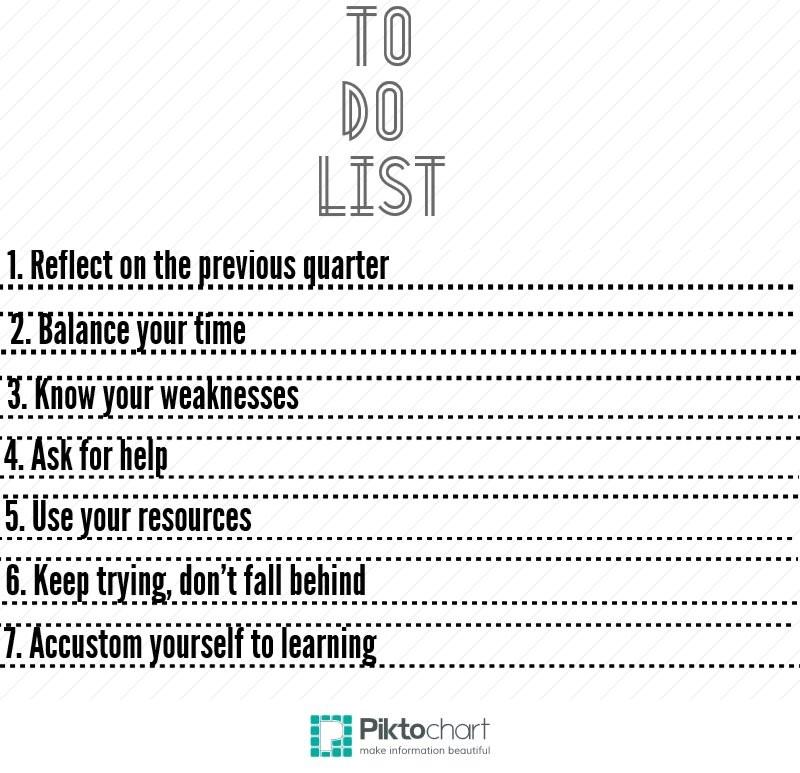Listen up: Seven ways to improve from first quarter
November 20, 2014
Second quarter is a time for second chances and a fresh start. It is a time to learn from your mistakes and fix the bad habits that may have held you back first quarter. Here are seven ways to help boost your grades before the semester ends:
- Reflect on the previous quarter. Learn from your triumphs and failures.
At the beginning of a new quarter, take time to truly reflect on the last one. What helped? What slowed you down? Keep learning and growing by keeping in mind both the things that have helped you and the things that have hurt you in the past. Making a list of pros and cons may also help you learn from what you’ve done in the past.
“It’s always a good idea to see what mistakes you’ve made academically and correct them so you’re more prepared,” senior Olivia Shannon said. “In calculus or any math for that matter, the only way to learn the material you got wrong is to go back and work them through.”
- Balance your time.
This is something you will hear time and time again because it is important in everything you do. It should not, however, just apply to balancing work with free time. Balance the time spent studying on each subject. Find out what you need to work on.
“To minimize stress it becomes really important to know how to divide your time up well,” junior Monica Oves said. “I worry much less now about things.”
- Know your weaknesses.
Learning what you are weaker at will save you a lot of grief down the road. You will not be good at everything, and knowing which subjects are not your strong suit will help you decide what you need to focus on. Have priorities, and work on your weaknesses before advancing your strengths.
“Knowing your weaknesses is important so you can know best how to study and learn for yourself,” senior Erin Schiffman said. “I learned that I have to write things down because I am a poor listener since I get distracted in class.”
4.Ask for help.
Once you know your weaknesses, focus on improving them. Not everything is going to come easily to you, and that’s fine. You don’t have to be a genius in every subject, but don’t let yourself fail one class just because you’re acing another. Ask the teacher or a peer. Do not be afraid to ask for help; there is nothing wrong with being lost or confused.
“Asking for help can get you to an easier and better answer through talking and collaborating,” junior Noah Fogelson said. “I began asking my teachers for feedback as I work on a project so I know whether I’m on the right track or not.”
5.Use your resources.
CHS offers many resources, so don’t take them for granted; look for guidance beyond the help of your teacher. The English writing lab, and National Honors Society tutors are some of the resources available. There are also many places you can go for help outside the walls of CHS. If you’re lost, keep searching.
“You should take advantage of teachers who are willing to help after school, before school, or at lunch,” junior Aishwarya sastry said. “ Many schools are not as privileged as us.”
- Keep trying, don’t fall behind.
It may be cliché, but you are not a reflection of your grades. One D on a quiz is not going to kill you, as long as you don’t let the bumps in the road keep you down forever. Remember, you’re not weak for falling down every now and then; just make sure to keep picking yourself back up.
“If you give up, you’ve already lost,” junior Madelyn Higgins said. “Winning and success come from overcoming and growing.”
7.Accustom yourself to learning.
This will not only improve your study habits, it will also help you grow as a human being: listen, pay attention and learn, not just in school, but everywhere you go. There is so much right in front of you that will help you in ways you are unaware of. Acquire knowledge from places outside of CHS because life continues after high school and it is important to keep a constant stream of learning. The more you accustom yourself to learning, the easier school will become.
“Something that I’d say is pretty important is figuring out how you personally learn best,” senior Claire Lin said. “I think I tend to retain information when I handwrite my notes, and I found out that there’s a certain mindset that I test really well in.”


